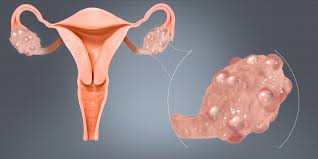PCOD Explained: What Every Woman Needs to Know

PCOD means Polycystic Ovarian Disease. Many women silently struggle with this but sometimes don’t fully understand that what is this and how to handle? Just imagine your ovaries as tiny factories producing eggs and certain hormones. In PCOD, these factories work a little differently, as they produce more male hormones (androgens) than usual and release eggs irregularly. Over the time, small cyst-like formations can develop, which can affect your menstrual cycle, skin, hair, and even your weight.
Many women first notice something is wrong when their periods become irregular, but sometimes coming late, sometimes not coming at all for months. Others see sudden weight gain, acne that doesn’t seem to go away, or unusual hair growth on the face and body. These changes can be frustrating, especially when you’re not sure what’s causing them.
The truth is, PCOD is not a rare condition, now it’s becoming more common because of lifestyle changes, stress, unhealthy eating, and lack of regular exercise. But it’s also something that can be managed with the right care and awareness.
Why PCOD Happens?
Doctors believe PCOD happens due to a mix of genetics and lifestyle factors. If your mother, sister, or other close relatives have it, your chances may be higher. Your body might also be producing insulin in a way that makes your ovaries release more androgens, disturbing your hormonal balance. This is why some women with PCOD also struggle with insulin resistance or even pre-diabetes.
Symptoms You Shouldn’t Ignore of PCOD
PCOD affects different women in different ways, but some common symptoms include:
- Irregular or missed periods
- Heavy bleeding during periods
- Acne and oily skin
- Weight gain or difficulty losing weight
- Hair thinning on the scalp but increased hair growth on the face or body
- Difficulty in conceiving
If you notice a combination of these symptoms, it’s a sign to get checked rather than ignore them.
How PCOD Can Affect Your Life?
Apart from the physical symptoms, PCOD can also affect your emotional health. Mood swings, low confidence due to skin or hair issues, and stress about fertility can weigh heavily on women. Left unmanaged, PCOD can increase the risk of diabetes, high blood pressure, and heart problems. This is why early diagnosis and proper management are so important. You can go for the PCOD treatment in Lajpat Nagar, Delhi, as the doctors or gynecologists of this place are highly qualified and experienced in this field.
Managing PCOD the Right Way
There’s no “one-size-fits-all” treatment for PCOD. Your doctor will guide you based on your symptoms, health goals, and lifestyle. Common recommendations include:
- Balanced Diet: Focus on whole foods, more vegetables, fruits, lean proteins, and less sugar and processed food.
- Regular Exercise: Helps in weight management and balances hormones.
- Stress Control: Yoga, meditation, or even a relaxing hobby can help reduce stress, which worsens hormonal imbalance.
- Medical Treatment: Sometimes, medicines are prescribed to regulate periods, reduce androgens, or help with insulin resistance.
The good news is that many women lead perfectly healthy, happy lives with PCOD once they understand it and make the right changes.
Final Words
PCOD can feel overwhelming, but you don’t have to fight it alone. The first step is understanding your body and taking action early. Get a more explained guide from the best gynecologist in Lajpat Nagar, Delhi, she will guide you properly on how to handle PCOD and how to fight it effectively. You can also book an appointment to see her in person for your health concerns. Taking expert advice can make all the difference in improving your health, confidence, and overall quality of life.




